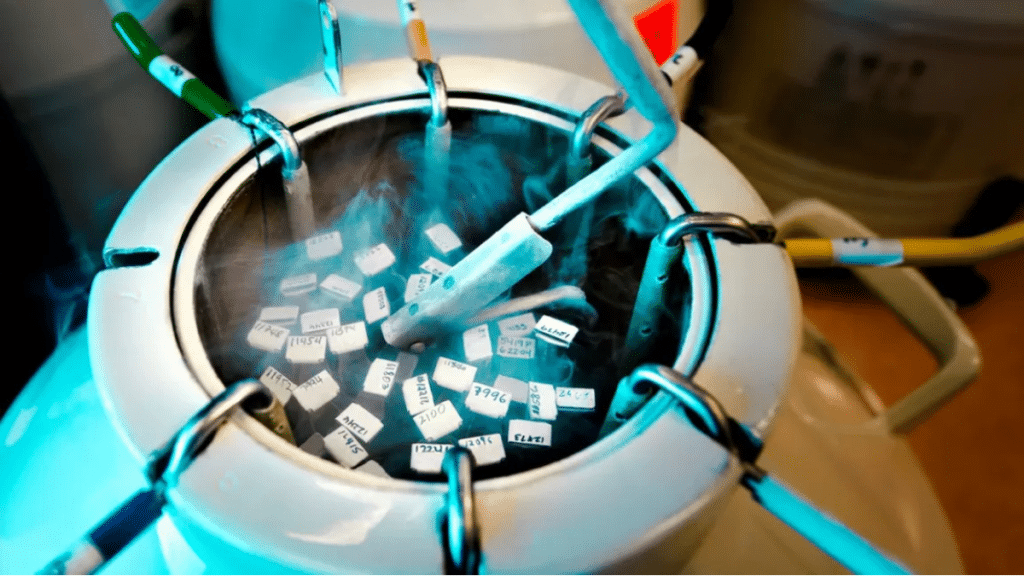For many people, the ability to plan for the future includes planning for a family. Whether due to medical treatments, career goals, or personal circumstances, preserving fertility through sperm banking has become increasingly common. One of the most frequent questions people ask is: How long can sperm actually be stored and remain viable? Thanks to decades of research and advances in cryopreservation, the answer is reassuring: frozen sperm can last for many years, even decades, without losing its ability to fertilize an egg.
Understanding Sperm Banking
Sperm banking is a process where a semen sample is collected, analyzed for quality, and then preserved for future use. The key to long-term storage lies in a technique called cryopreservation. During this process, the sperm is cooled and stored in liquid nitrogen at temperatures near -196°C. At this temperature, all cellular activity essentially halts, placing the sperm in a state of suspended animation.
The freezing process involves adding cryoprotectants, special solutions that protect cells from damage during freezing and thawing. Once stored, the sperm remains completely inactive until thawed, when it can be used for procedures such as intrauterine insemination (IUI) or in vitro fertilization (IVF).
How Long Can Frozen Sperm Last?
The science behind sperm freezing shows that when stored under ideal conditions, sperm can remain viable indefinitely. There is no natural expiration date as long as the storage environment remains stable.
In one significant case, sperm frozen for 28 years was later thawed and used successfully to achieve live births via intrauterine insemination (IUI). Even after nearly three decades, the sample remained capable of fertilization
Does Time in Storage Affect Sperm Quality?
A common concern is whether long-term freezing impacts the quality of sperm. Research has shown that it does not. What matters most is the quality of the sample at the time of freezing. If the sperm is healthy when frozen, it remains healthy, even decades later, as long as it is stored properly.
A 2019 study analyzed fertilization and pregnancy rates using sperm stored for different lengths of time. It found no significant difference between sperm stored for less than five years and those stored for more than 10 years. These findings provide reassurance that long-term storage does not compromise success rates when the sperm is eventually used.
How Storage Facilities Maintain Sperm Viability
The longevity of frozen sperm depends heavily on consistent and reliable storage conditions. Cryogenic storage tanks must remain at ultra-low temperatures without fluctuation, which is why facilities rely on advanced monitoring systems, backup power supplies, and redundant safety protocols. These measures are e ssential for maintaining sample integrity over many years.
Facilities that provide sperm bank services, like Cryobank OC in California, utilize these rigorous standards to ensure samples remain viable, regardless of how long they are stored. With proper care, frozen sperm remains essentially unchanged over time, allowing individuals to confidently plan for a family years or even decades after their sperm was originally banked.
Why Do People Choose Sperm Banking?
There are many reasons someone may decide to bank their sperm, including:
- Medical treatments: Individuals undergoing chemotherapy, radiation, or surgeries that may affect fertility often freeze sperm beforehand as a safeguard.
- Life planning: Some people choose to delay parenthood until later in life, ensuring they have viable sperm for future family planning.
- High-risk professions: Military personnel or those working in hazardous environments may opt for sperm banking as a precaution.
- Assisted reproduction: Couples pursuing treatments like IVF or surrogacy often use stored sperm as part of the process.
Fertility preservation is becoming increasingly important as infertility rates rise. According to the Centers for Disease Control and Prevention (CDC), approximately 1 in 8 couples in the United States struggles with infertility. This statistic underscores why options like sperm banking are valuable for individuals and couples planning for the future.
What to Know Before Banking Sperm
If you are considering sperm banking, here are some important points to keep in mind:
- The initial sperm quality will determine future success rates, so testing and analysis are part of the process.
- Properly frozen sperm does not degrade over time, meaning storage length is rarely a limiting factor.
- Storage fees are typically charged on an annual basis, so long-term planning is essential.
- When you are ready to use your stored sperm, a fertility specialist can guide you through thawing/ and treatment options like IUI or IVF.
The Takeaway
Modern cryopreservation technology has made it possible to store sperm safely and effectively for decades. There is no evidence that extended storage affects the ability of sperm to fertilize an egg or produce a healthy pregnancy, as long as proper protocols are followed.
For anyone facing medical treatments, career considerations, or other life circumstances that could impact future fertility, sperm banking offers peace of mind and flexibility.
